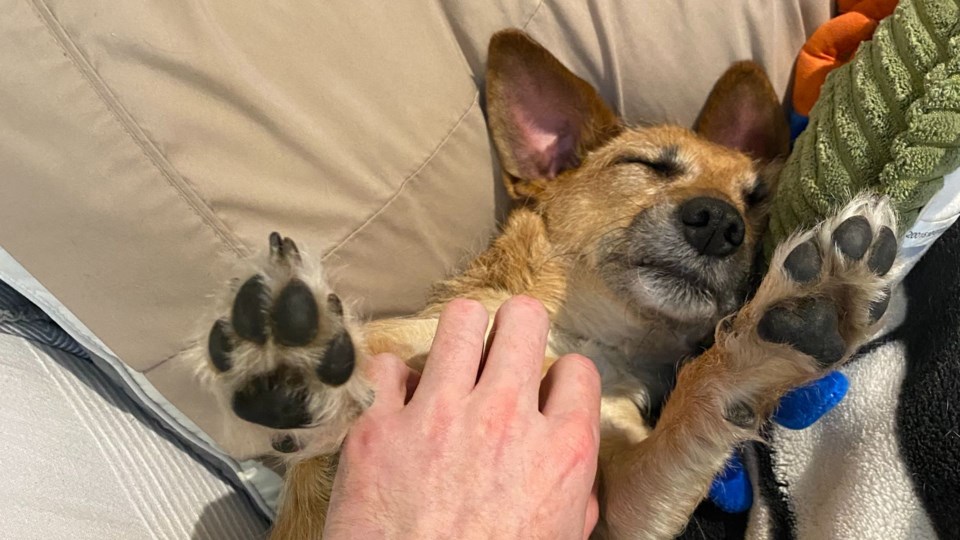It is alarmingly easy to lose sight of the things that truly matter—to get all crossed up in nothing at all.
Manufactured interpersonal drama; horrid news headlines from abroad; artificial anxieties nagging at the inside of your frontal lobe, twisting your nerve endings and setting off alarm bells in your stomach.
But why? Why is that historical embarrassment still eating at you, years later?
What does it matter if the church group didn’t like your casserole?
What is this thing we’re all doing called “life,” and why is it so often so sad and uncomfortable?
Why can’t we find peace inside ourselves?
These are the types of enormous questions philosophers have probed for centuries; far be it from me to provide any kind of concrete guidance.
Though if I had to guess, I suspect shades of the real answer are evident in the simple, loyal love of a dog.
It was an easy revelation on my part, gleaned from a short, afternoon nap with a cuddly, stinky little pup.
Here was this fuzzy creature, so full of warmth and love and personality, motivated almost entirely by ancient, animal instincts, peering up at me with a heart-melting look of lazy affection I was sure in that moment could end any war.
If everyone had their own little lovable pup, I knew right then, there would be no more need for fighting.
Preaching to the choir, certainly. Whistler loves dogs.
For proof, look no further than Pique’s annual Best of Whistler reader survey, which has crowned local shelter Whistler Animals Galore favourite non-profit too many years in a row to count.
According to the Canadian Animal Health Institute, about 8 million Canadian households had a dog in 2022.
In Whistler, the number of dog licences issued annually varies. In 2023, there were 518 dog licences issued in the resort, according to the Resort Municipality of Whistler (RMOW), or about 9.2 per cent of Whistler’s 5,600 or so households.
The actual number of pups in our community often feels, and likely is, much higher, factoring in all the unlicenced and just-visiting dogs on any given day.
No complaints here—I would argue there is no better place to spend a lazy, sunny afternoon in Whistler than Barking Bay, where the pups reign supreme.
But not everyone is onboard, particularly when those pooches are off-leash where they shouldn’t be.
The RMOW passed a new animal responsibility bylaw in 2019, which sets out the rules for ownership. In short: leashes, licences, poo bags, and good behaviour. Oh, and don’t leave your pup tied up and unattended on public property (read more at whistler.ca/dogs).
The RMOW currently has four “official” off-leash areas for dogs, at Alpha Lake, Bayly Park, Rainbow Park and Lost Lake Park, with another three mixed-use areas in Spruce Grove, Meadow Park and on the Valley Trail (off-leash dogs permitted in winter only).
In this week’s cover feature, you’ll read about some of the hardest-working, most heroic dogs in all of Whistler—Whistler Blackcomb’s avalanche rescue dog team.
Because what’s not to like about a dog with a job?
As if we needed more reasons to revere them, avalanche pups take the concept of human’s best friend to its ultimate end, using their powerful noses not to suss out the treats in the closet, but human bodies in distress under metres of compacted snow.
Bonafide lifesavers, avalanche rescue dogs can search an area in 30 minutes that would take a dozen humans several hours. And that’s just one of the more dramatic examples of canine resourcefulness.
Multiple studies have shown having a dog in your life can decrease loneliness, stress, and anxiety, leading to lower blood pressure and reduced heart risk.
Dogs are proven to help humans cope with and recover from traumatic events—think military veterans with PTSD—and just having one can boost your fitness levels through the simple act of regular daily walks.
Still not convinced?
More than one study has proven dogs make a person more attractive, or trustworthy.
One such study from 2015 published in the journal Anthrozoös found the presence of a dog was associated with “a higher rate of helping behaviour” among strangers.
Researchers found people were more likely to give strangers money, help them pick up dropped items, or even give them their phone number if a dog was present.
This is fantastic news for those of us who are, er, aesthetically challenged.
So if you find yourself struggling with the first two rules of dating (1: be attractive, and, 2: don’t be unattractive), it’s good to know you can potentially rebalance the scales with an especially cute pup.
For all the time and energy we expend on other humans, with their anxious meddling, and their social hang-ups, and their made-up drama, one has to wonder if we’re all barking up the wrong tree—if the real wisdom is found in the philosophy of woof.
There’s nothing here but us, and we’ve got nothing but time. The meaning of life? It’s this, right here.
To live, and live well.
Find the small joys in every moment, without complaint or reservation.
Love whoever is around to be loved.
Tomorrow is the distant future.
So let’s go outside and embrace today for what it is; then we’ll take a quiet nap together on the couch.
Dogs get the truth of it—and we don’t deserve them.



